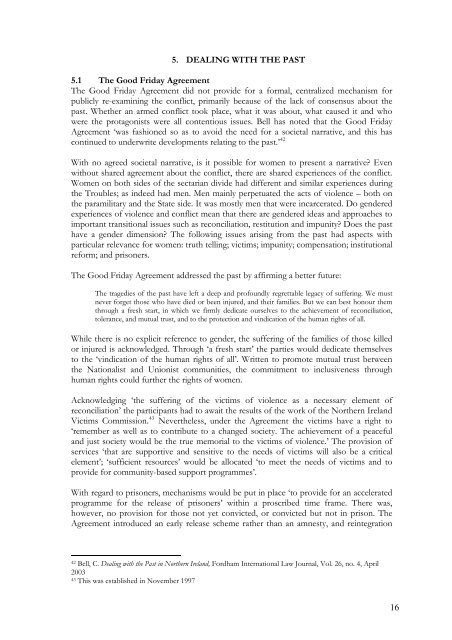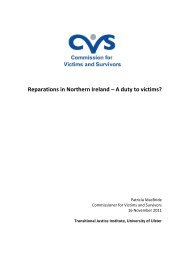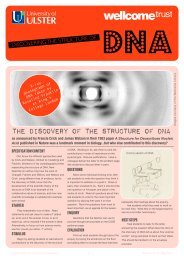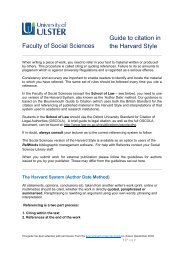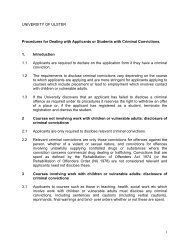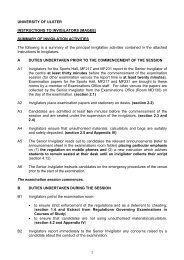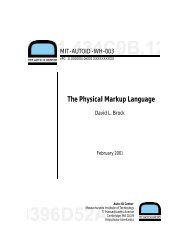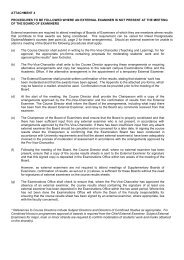Agreement Reached in the Multi-Party Negotiations - Transitional ...
Agreement Reached in the Multi-Party Negotiations - Transitional ...
Agreement Reached in the Multi-Party Negotiations - Transitional ...
You also want an ePaper? Increase the reach of your titles
YUMPU automatically turns print PDFs into web optimized ePapers that Google loves.
5. DEALING WITH THE PAST<br />
5.1 The Good Friday <strong>Agreement</strong><br />
The Good Friday <strong>Agreement</strong> did not provide for a formal, centralized mechanism for<br />
publicly re-exam<strong>in</strong><strong>in</strong>g <strong>the</strong> conflict, primarily because of <strong>the</strong> lack of consensus about <strong>the</strong><br />
past. Whe<strong>the</strong>r an armed conflict took place, what it was about, what caused it and who<br />
were <strong>the</strong> protagonists were all contentious issues. Bell has noted that <strong>the</strong> Good Friday<br />
<strong>Agreement</strong> ‘was fashioned so as to avoid <strong>the</strong> need for a societal narrative, and this has<br />
cont<strong>in</strong>ued to underwrite developments relat<strong>in</strong>g to <strong>the</strong> past.’ 42<br />
With no agreed societal narrative, is it possible for women to present a narrative? Even<br />
without shared agreement about <strong>the</strong> conflict, <strong>the</strong>re are shared experiences of <strong>the</strong> conflict.<br />
Women on both sides of <strong>the</strong> sectarian divide had different and similar experiences dur<strong>in</strong>g<br />
<strong>the</strong> Troubles; as <strong>in</strong>deed had men. Men ma<strong>in</strong>ly perpetuated <strong>the</strong> acts of violence – both on<br />
<strong>the</strong> paramilitary and <strong>the</strong> State side. It was mostly men that were <strong>in</strong>carcerated. Do gendered<br />
experiences of violence and conflict mean that <strong>the</strong>re are gendered ideas and approaches to<br />
important transitional issues such as reconciliation, restitution and impunity? Does <strong>the</strong> past<br />
have a gender dimension? The follow<strong>in</strong>g issues aris<strong>in</strong>g from <strong>the</strong> past had aspects with<br />
particular relevance for women: truth tell<strong>in</strong>g; victims; impunity; compensation; <strong>in</strong>stitutional<br />
reform; and prisoners.<br />
The Good Friday <strong>Agreement</strong> addressed <strong>the</strong> past by affirm<strong>in</strong>g a better future:<br />
The tragedies of <strong>the</strong> past have left a deep and profoundly regrettable legacy of suffer<strong>in</strong>g. We must<br />
never forget those who have died or been <strong>in</strong>jured, and <strong>the</strong>ir families. But we can best honour <strong>the</strong>m<br />
through a fresh start, <strong>in</strong> which we firmly dedicate ourselves to <strong>the</strong> achievement of reconciliation,<br />
tolerance, and mutual trust, and to <strong>the</strong> protection and v<strong>in</strong>dication of <strong>the</strong> human rights of all.<br />
While <strong>the</strong>re is no explicit reference to gender, <strong>the</strong> suffer<strong>in</strong>g of <strong>the</strong> families of those killed<br />
or <strong>in</strong>jured is acknowledged. Through ‘a fresh start’ <strong>the</strong> parties would dedicate <strong>the</strong>mselves<br />
to <strong>the</strong> ‘v<strong>in</strong>dication of <strong>the</strong> human rights of all’. Written to promote mutual trust between<br />
<strong>the</strong> Nationalist and Unionist communities, <strong>the</strong> commitment to <strong>in</strong>clusiveness through<br />
human rights could fur<strong>the</strong>r <strong>the</strong> rights of women.<br />
Acknowledg<strong>in</strong>g ‘<strong>the</strong> suffer<strong>in</strong>g of <strong>the</strong> victims of violence as a necessary element of<br />
reconciliation’ <strong>the</strong> participants had to await <strong>the</strong> results of <strong>the</strong> work of <strong>the</strong> Nor<strong>the</strong>rn Ireland<br />
Victims Commission. 43 Never<strong>the</strong>less, under <strong>the</strong> <strong>Agreement</strong> <strong>the</strong> victims have a right to<br />
‘remember as well as to contribute to a changed society. The achievement of a peaceful<br />
and just society would be <strong>the</strong> true memorial to <strong>the</strong> victims of violence.’ The provision of<br />
services ‘that are supportive and sensitive to <strong>the</strong> needs of victims will also be a critical<br />
element’; ‘sufficient resources’ would be allocated ‘to meet <strong>the</strong> needs of victims and to<br />
provide for community-based support programmes’.<br />
With regard to prisoners, mechanisms would be put <strong>in</strong> place ‘to provide for an accelerated<br />
programme for <strong>the</strong> release of prisoners’ with<strong>in</strong> a proscribed time frame. There was,<br />
however, no provision for those not yet convicted, or convicted but not <strong>in</strong> prison. The<br />
<strong>Agreement</strong> <strong>in</strong>troduced an early release scheme ra<strong>the</strong>r than an amnesty, and re<strong>in</strong>tegration<br />
42 Bell, C. Deal<strong>in</strong>g with <strong>the</strong> Past <strong>in</strong> Nor<strong>the</strong>rn Ireland, Fordham International Law Journal, Vol. 26, no. 4, April<br />
2003<br />
43 This was established <strong>in</strong> November 1997<br />
16


